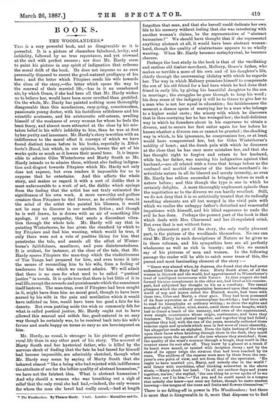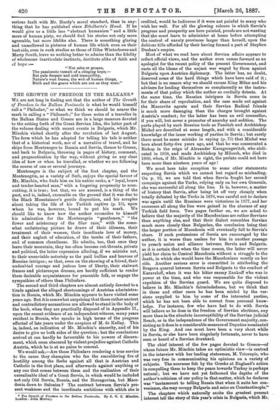BOOKS.
THE WOODLANDERS.*
Tabs is a very powerful book, and as disagreeable as it is powerful. It is a picture of shameless falsehood, levity, and infidelity, followed by no true repentance, and yet crowned at the end with perfect success ; nor does Mr. Hardy seem to paint his picture in any spirit of indignation that redeems the moral drift of the book. He does not impress us as even personally disposed to resent the good-natured profligacy of his hero ; and the letter which Fitzpiers sends his wife towards the close of the story,—the letter which opens the way to the renewal of their married life,—has in it an unashamed air, by which Grace, if she had been all that Mr. Hardy wishes us to believe her, would have been more revolted than gratified. On the whole, Mr. Hardy has painted nothing more thoroughly disagreeable than this mendacious, easy-going, conscienceless, passionate young doctor, with his fastidious selfishness and his scientific acuteness, and his aristocratic self-esteem, availing himself of the weakness of every woman for whom he feels the least fancy, and almost more attracted at the close by his mis- taken belief in his wife's infidelity to him, than he was at first byher purity and innocence. Mr.Hardy's story is written with an indifference to the moral effect it conveys of which we have found distinct traces before in his books, especially in Ethel. herta'e Hand, but which, in our opinion, lowers the art of his works quite as much as it lowers their moral tone. It is impos- sible to admire Giles Winterborne and Marty South as Mr. Hardy intends us to admire them, without also feeling indigna- tion and disgust towards Fitzpiers which Mr. Hardy not only does not express, but even renders it impossible for us to suppose that he entertains. And this affects the whole story, and makes us regard it with a sort of dislike that is most unfavourable to a work of art, the dislike which springs from the feeling that the artist has not truly estimated the significance of his own work. A more unworthy and godless -creature than Fitzpiers to find favour, as he evidently does, in the mind of the artist who painted his likeness, it would not be easy to discover in our modern fiction ; and though he is well drawn, be is drawn with an air of something like apology, if not sympathy, that sends a discordant vibra- tion through the whole tale. Mr. Hardy will say that in painting Winterborne, he has given the standard by which to try Fitzpiers and find him wanting, which would be true, if only there were not a vein of positive liking for him that penetrates the tale, and annuls all the effect of Winter- borne's faithfulness, manliness, and pare disinterestedness. It is evident, for instance, at the close of the tale, that Mr. Hardy spares Fitzpiers the man-trap which the vindictiveness of Tim Tangs had prepared for him, and even turns it into the means of reconciling him to his wife, from a feeling of tenderness for him which we cannot admire. We will admit that there is no case for what used to be called " poetical justice " in novels. It is quite true that there is but little of it in real life, except the rewards and punishments which the conscience itself bestows. The man-trap, even if Fitzpiers had been caught in it, might have done him no moral good, though to have been cursed by his wife in the pain and mutilation which it would have inflicted on him, would have been too good a fate for his deserts. But even putting aside the wish so commonly felt for what is called poetical justice, Mr. Hardy ought not to have allowed this sensual and selfish liar, good-natured in an easy way though he certainly was, to be received back into his wife's favour and made happy on terms so easy as are here imposed on him.
Mr. Hardy, as usual, is stronger in his pictures of genuine rural life than in any other part of his story. The account of Marty South and her hysterical father, who is killed by the nervous shock of finding that the fate he had feared for himself 'had become impossible, are admirably sketched, though what Mr. Hardy may mean by saying of Marty South that she behaved almost " like a being who had rejected with indifference 'the attribute of sex for the loftier quality of abstract humanism," 'We have not the faintest idea. What is abstract humanism ? And why should a woman who was breathing out a sigh of relief that the only rival she had had,—indeed, the only woman for whom the man she loved had really cared,—had at length '4 The Woodlandere. Thomas Hardy. 3 vols. London : Macmillan and Co.
forgotten that man, and that she herself could dedicate her own life to his memory without feeling that she was interfering with another woman's claims, be the representative of "abstract humanism ?" We should have thought that if she represented anything abstract at all, it would have been abstract woman- hood, though the quality of abstractness appears to us wholly wanting. When Mr. Hardy becomes metaphysical, he becomes obscure.
Perhaps the beet study in the book is that of the vacillating and restless old timber-merchant, Melbury, Grace's father, who makes so terrible a mess of his own and of his daughter's life, chiefly through the overweening idolatry with which he regards her. The way in which Melbury promises himself to compensate the son of his old friend for a bad tarn which he had done that friend in early life, by giving his beautiful daughter to the eon in marriage ; the struggles he goes through to keep his word ; his deep sense of the indignity it will be to Grace to give her to a man who is not her equal in education ; his faithlessness the moment a chance opens of marrying her to a man who belongs to a higher social caste ; the misery with which he discovers that in thus marrying her he has wronged her ; the half-delirious way in which he flounders about in his eagerness to obtain a divorce, and to secure her first suitor again for her before he knows whether a divorce can or cannot be granted ; the shocking way in which, in his ignorance, he compromises her, or at least would have compromised her, but for Giles Winterborne's nobility of heart ; and the dumb pain with which he discovers at the close that he has once more mistaken her, and that she has thought right to forgive and return to her husband, while he, her father, was nursing his indignation against that husband,—are all related with a force that brings before us the confused and morbid character of the timber-merchant's in- articulate nature in all its blurred and moody intensity, as even Mr. Hardy has seldom succeeded in bringing before us such a nature before ; and this though the type is one in which he certainly delights. A more thoroughly unpleasant episode than the negotiation as to the divorce we can hardly recollect. Stall, we do not deny that it is so artistically treated that its radically revolting elements are all but merged in the vivid pain with which we realise the unhappy father's disturbed and remorseful impatience with himself, and his blind eagerness to undo the evil he has done. Perhaps the poorest part of the book is that which deals with Mrs. Charmond and her ill-regulated min& But even that is not without force.
The pleasantest part of the story, the only really pleasant part, is the picture of the woodlands themselves. No one can rival Mr. Hardy in such descriptions of Nature as he gives us in these volumes, and bis sympathies here are all perfectly wholesome as well as rich in beauty ; and this we cannot say of his pictures of men and women. In the following passage the reader will be able to catch some trace of this, the purest and most fascinating element of the story " Grace was abased when, by degrees, she found that she had never understood Giles as Marty had done. Marty South alone, of all the women in Hintock and the world, had approximated to WinEerboree's level of intelligent intercourse with Nature. In that respect she had formed his true complement in the other sex, had lived as his counter- part, had subjoined her thought to his as a corollary. The casual glimpses which the ordinary population bestowed upon that wondrous world of sap and leaves called the Hintock woods, had been with these two, Giles and Marty, a clear gaze. They had been possessed of its finer mysteries as of commonplace knowledge ; had boon able to read its hieroglyphs as ordinary writing ; to them the sights and sounds of night, winter, wind, storm, amid those dense boughs, which had to Grace a touch of the uncanny, and even of the supernatural, were simple occurrences whose origin, continuance, and laws they foreknew. They had planted together, and together they had felled ; together they had, with the ran of the years, mentally collected those remoter signs and symbols which seen in few were of runic obscurity, but altogether made an alphabet. From the light lashing of the twigs upon their faces when brushing through them in the dark, they could pronounce upon the species of the tree whence they stretched ; from the quality of the wind's murmur through a bough, they could in like manner name its sort afar off. They knew by a glance at a trunk if its heart were sound, or tainted with incipient decay ; and by the state of its upper twigs the stratum that had been reached by its roots. The artifices of the seasons were seen by them from the con- jurer's own point of view, and not from that of the spectator. He ought to have married you, Marty, and nobody else in the world !' said Grace with conviction, after thinking somewhat in the above strain.—Marty shook her head. ' In all our outdoor days and years together, ma'am,' she replied, the one thing he never spoke of to me was love; nor Ito him:—'Yet you and he could speak in a tongue that nobody else knew—not even my father, though he came nearest knowing—the tongue of the trees sod fruits and flowers themselves.' "
There is no falling-off in power in The Woodiand,ere ; but there is more that is disagreeable in it, more that disposes us to find serious fault with Mr. Hardy's moral standard, than in any- thing that he has published since Ethelberta'e Hand. If he would give us a little less "abstract humanism " and a little more of human piety, we should find his stories not only more agreeable, but more lifelike also. There is something glaring and unmellowed in pictures of human life which even on their best side, even in such studies as those of Giles Winterborne and Marty South, leave us nothing better to admire than the fidelity of wholesome inarticulate instincts, destitute alike of faith and of hope :— "Not sobs or groans, The passionate tumult of a clinging hope,— Bat pale despair and cold tranquillity, Nature's vast frame, the web of human things, Birth and the grave which are not as they were."















































 Previous page
Previous page